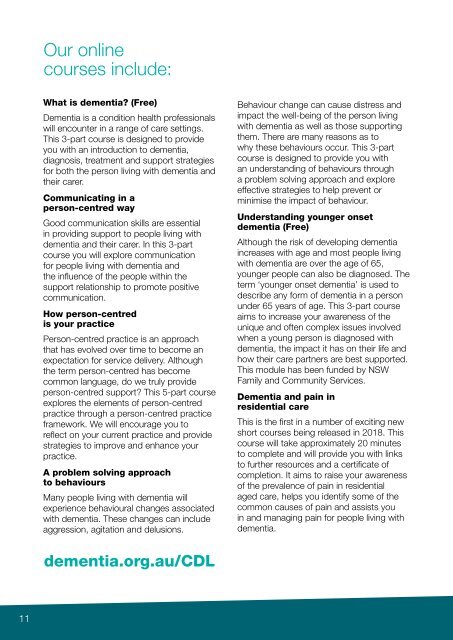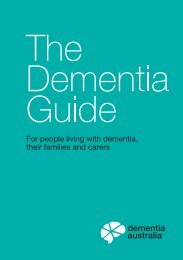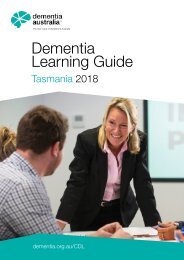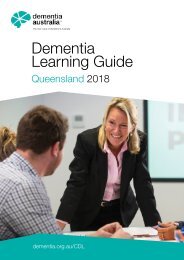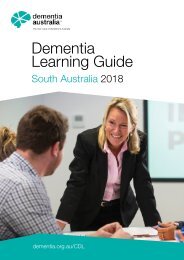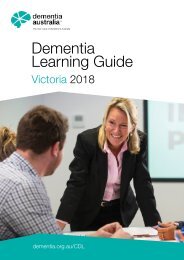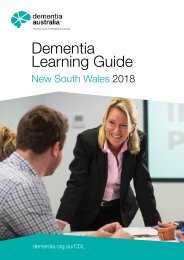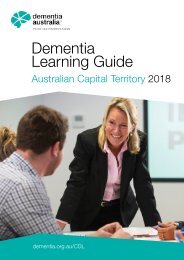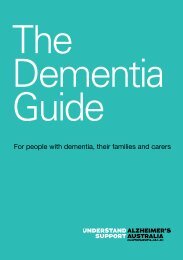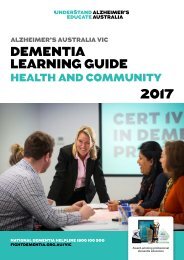DementiaLearningGuide-NT
Create successful ePaper yourself
Turn your PDF publications into a flip-book with our unique Google optimized e-Paper software.
Our online<br />
courses include:<br />
What is dementia? (Free)<br />
Dementia is a condition health professionals<br />
will encounter in a range of care settings.<br />
This 3-part course is designed to provide<br />
you with an introduction to dementia,<br />
diagnosis, treatment and support strategies<br />
for both the person living with dementia and<br />
their carer.<br />
Communicating in a<br />
person-centred way<br />
Good communication skills are essential<br />
in providing support to people living with<br />
dementia and their carer. In this 3-part<br />
course you will explore communication<br />
for people living with dementia and<br />
the influence of the people within the<br />
support relationship to promote positive<br />
communication.<br />
How person-centred<br />
is your practice<br />
Person-centred practice is an approach<br />
that has evolved over time to become an<br />
expectation for service delivery. Although<br />
the term person-centred has become<br />
common language, do we truly provide<br />
person-centred support? This 5-part course<br />
explores the elements of person-centred<br />
practice through a person-centred practice<br />
framework. We will encourage you to<br />
reflect on your current practice and provide<br />
strategies to improve and enhance your<br />
practice.<br />
A problem solving approach<br />
to behaviours<br />
Many people living with dementia will<br />
experience behavioural changes associated<br />
with dementia. These changes can include<br />
aggression, agitation and delusions.<br />
Behaviour change can cause distress and<br />
impact the well-being of the person living<br />
with dementia as well as those supporting<br />
them. There are many reasons as to<br />
why these behaviours occur. This 3-part<br />
course is designed to provide you with<br />
an understanding of behaviours through<br />
a problem solving approach and explore<br />
effective strategies to help prevent or<br />
minimise the impact of behaviour.<br />
Understanding younger onset<br />
dementia (Free)<br />
Although the risk of developing dementia<br />
increases with age and most people living<br />
with dementia are over the age of 65,<br />
younger people can also be diagnosed. The<br />
term ‘younger onset dementia’ is used to<br />
describe any form of dementia in a person<br />
under 65 years of age. This 3-part course<br />
aims to increase your awareness of the<br />
unique and often complex issues involved<br />
when a young person is diagnosed with<br />
dementia, the impact it has on their life and<br />
how their care partners are best supported.<br />
This module has been funded by NSW<br />
Family and Community Services.<br />
Dementia and pain in<br />
residential care<br />
This is the first in a number of exciting new<br />
short courses being released in 2018. This<br />
course will take approximately 20 minutes<br />
to complete and will provide you with links<br />
to further resources and a certificate of<br />
completion. It aims to raise your awareness<br />
of the prevalence of pain in residential<br />
aged care, helps you identify some of the<br />
common causes of pain and assists you<br />
in and managing pain for people living with<br />
dementia.<br />
dementia.org.au/CDL<br />
11<br />
10


